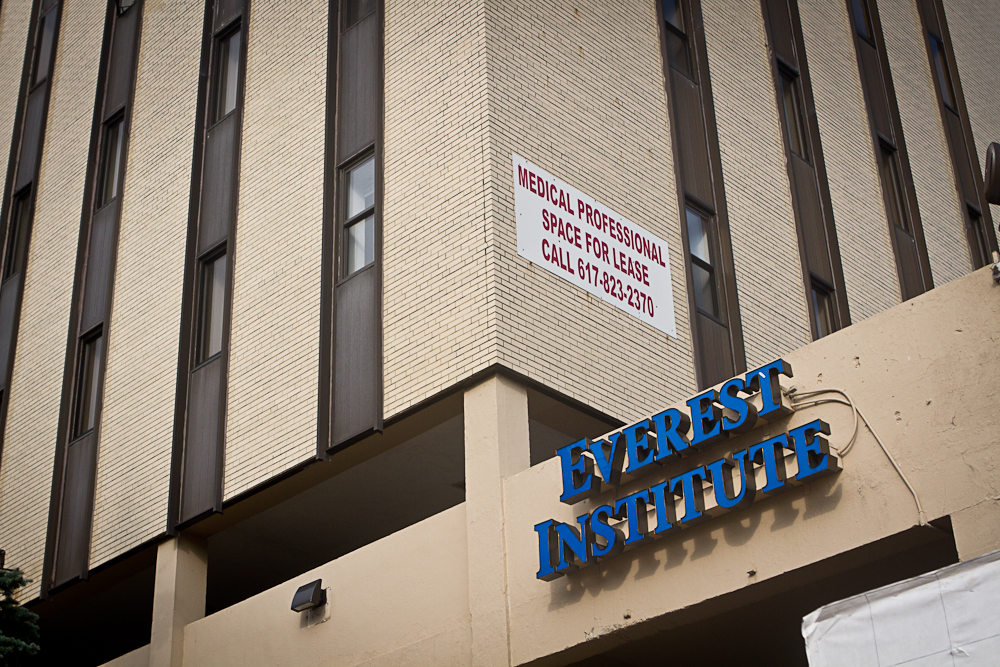
The Everest Institute in Boston was one of 97 Corinthian-owned campuses across the country that shut down in 2014. (Mallory Noe-Payne/WGBH)
In 2014, the U.S. Department of Education found that the now-defunct Corinthian Colleges used high-pressure sales tactics and lied about student enrollment and graduation rates—fraudulent practices the government has acknowledged merit student loan forgiveness. But nearly 80,000 former Corinthian students are facing some form of debt collection, according to an investigation by the office of Sen. Elizabeth Warren. In a letter sent to U.S. Secretary of Education John B. King, Jr. on Thursday, Warren urged the Department to halt collections of those loans, and to discharge students’ debt.
“Instead of focusing on getting these students the relief they are entitled to under federal law, the Department’s student loan bank—working with its loan services and debt collectors—is instead intentionally collecting on debt that it knows may be eligible for discharge,” Warren wrote to King.
Last year, the department announced a “fast-track” relief process, that, according to Education Undersecretary Ted Mitchell, would allow some Corinthian students to get debt relief without making “any individual showing that they were affected by [Corinthian’s] fraud.” Then, in March, 2015, the Department announced additional findings of fraud against 91 separate campuses, expanding the relief process. But Warren said the system remains “badly broken.”
“Even amid announcements of more fraud, the department inexplicably still refused to establish a real expedited relief program that automatically discharged the debts of Corinthian students who it knows were eligible for discharge,” she wrote. “In fact, while these announcements made for good headlines, that broad relief never came.”
Related: Sen. Warren Introduces Legislation To Fix 'Broken' Accreditation System
Given the widespread fraud at schools operated by Corinthian, the department has the authority to cancel federal student loans. But it’s up to the student to apply for debt relief—a process Warren called “complex, resource intensive, unnecessary and baffling.”
According to Warren’s investigation, over 79,000 students are eligible to apply for debt relief but only 23,185 students have filed claims as of June. “Only a tiny fraction”—around 4,000—have received relief, Warren writes.
In a statement, Education Undersecretary Ted Mitchell said the Department is committed to former Corinthian students.
"Since Corinthian's closure, we've conducted ongoing, extensive direct outreach to Corinthian borrowers who may be eligible for debt relief through the closed school loan discharge program or defense to repayment claims," he said. "This fall, we will build upon that outreach, including through a targeted effort to reach Corinthian borrowers who have loans in collections or subject to Treasury tax offsets or wage garnishment."
In her letter, Warren acknowledged the department has recently taken strong steps to “prevent fraud before it happens,” citing restrictions that led to the shutting down of ITT Tech, and the shutting down of the Accrediting Council for Independent Colleges and Schools, the country’s largest accreditor of for-profit schools.
The letter comes a day after Darnell Williams—a former student of Everest Institute in Chelsea, Massachusetts—filed a federal lawsuit, alleging the government is continuing to collect money from students who took out loans to attend schools operated by Corinthian.
On Campus intern Dina Kleiner contributed to this story.
Earlier: Former ITT Students Say Transfer, Loan Discharge Options Fall Short










